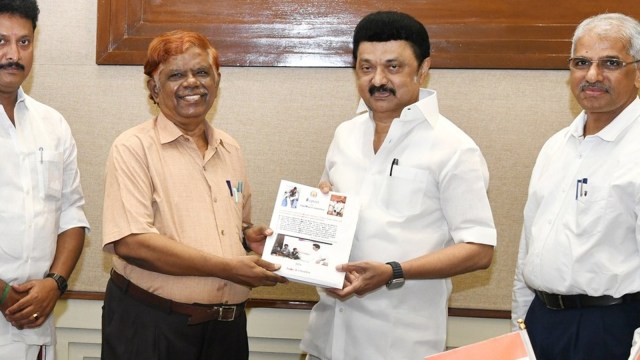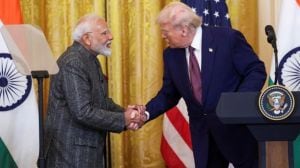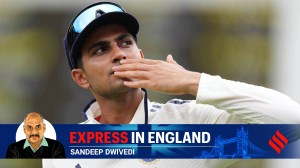How Tamil Nadu should remove casteism from its schools — retired Madras HC judge submits report to DMK govt
The report, submitted to the DMK govt on Tuesday, has drawn protests not only from the BJP but also the Kallar caste group and govt teachers.
 Retired Justice K Chandru presented the report to CM MK Stalin. (Source: X/@CMOTamilnadu)
Retired Justice K Chandru presented the report to CM MK Stalin. (Source: X/@CMOTamilnadu)Banning caste markers such as coloured wristbands or rings, removing caste affiliations from school names and, most significantly, periodic transfer of teachers — these are some of the major measures recommended by a panel to prevent caste discrimination in Tamil Nadu schools.
The one-man committee, constituted under retired Madras High Court judge K. Chandru last August after two Dalit siblings were brutally assaulted by their relatively upper-caste classmates in Tirunelveli, submitted a comprehensive 610-page report on Monday.
Justice Chandru’s report, submitted to Chief Minister M.K. Stalin, was compiled after visiting several districts, teachers, educationists and students — including those who were attacked. It proposes a multifaceted approach to address the deep-rooted problem.
Central to his recommendations is the periodic transfer of high school and higher secondary school teachers to ensure that educators do not serve extended tenures in one location —particularly in areas where their own caste holds sway.
Other recommendations include a ban on caste-markers such as wristbands, rings, or forehead marks on the school premises and a mandatory orientation programme for Classes 6 to 12 on caste discrimination and caste violence, sexual harassment and sexual violence and laws such as the Scheduled Caste and Scheduled Tribes (Prevention) of Atrocities Act.
Here are some major suggestions:
* One of its most important recommendations is the removal of caste appellations from both government and private schools. According to the report, schools with names such as ‘Kallar Reclamation’ and ‘Adi Dravidar Welfare’ should be renamed to eliminate any reference to caste. For private institutions, the school education department should request compliance, and if necessary, pursue legislative changes to enforce this policy.
*Seating arrangements in classrooms should be based strictly on alphabetical order, with exceptions made only for differently-abled students. Moreover, attendance registers should not contain any information on students’ caste.
*There should be a School Welfare Officer (SWO) for each secondary school with over 500 students for overseeing policies aimed at fostering an inclusive and discrimination-free environment. In co-educational settings, there should be two SWOs, one of each gender.
*To ensure the enforcement of these measures, a Social Justice Students Force (SJSF) should be created. Modelled on the National Service Scheme (NSS) but independent of the Union government, this force would include students from all communities working together to combat social evils.
*On the administrative front, chief educational officers, district educational officers, block educational officers, and headmasters of high and higher secondary schools should not be posted in areas where their caste is dominant. The Annual Confidential Reports (ACR) for these officers should include evaluations of their attitudes towards Scheduled Castes (SCs) and Scheduled Tribes (STs).
*There should be a statutory code of conduct for teachers and staff across all state-run educational institutions, a separate legislation to enforce social inclusion and a robust grievance redressal mechanism to allow students to report caste-based grievances confidentially.
*Other suggestions include allowing student associations in all schools and colleges with annual elections, increasing local bodies’ control over primary education, prohibiting the use of school properties for non-educational purposes, managing noon meal schemes more efficiently through block-level central kitchens, and establishment of special intelligence units.
Objections
Despite its comprehensive nature, the report also noted the lack of input from key stakeholders such as organised teachers’ associations and student organisations — both considered crucial to the implementation of these recommendations.
Political parties, with the exception of the Dravida Kazhagam (DK), Communist Party of India (Marxist), Viduthalai Chiruthaigal Katchi (VCK), and Vaiko’s Marumalarchi Dravida Munnetra Kazhagam (MDMK), too stayed away from deliberations, it says.
This includes the ruling DMK.
Meanwhile, there has been criticism against some of the recommendations. Former Tamil Nadu BJP president H. Raja has objected to the suggestion that coloured wristbands, rings or forehead marks should be banned, calling it “anti-Hindu”.
“How could the report object to tilak (forehead markings)? The State government should reject the report in its entirety,” it says.
Criticism also came from two other quarters — from the OBC-Kallar caste group and government teachers. While the Kallars have taken offence to the suggestion of dropping caste appellations, teachers have a problem with the proposed transfer of educators.












